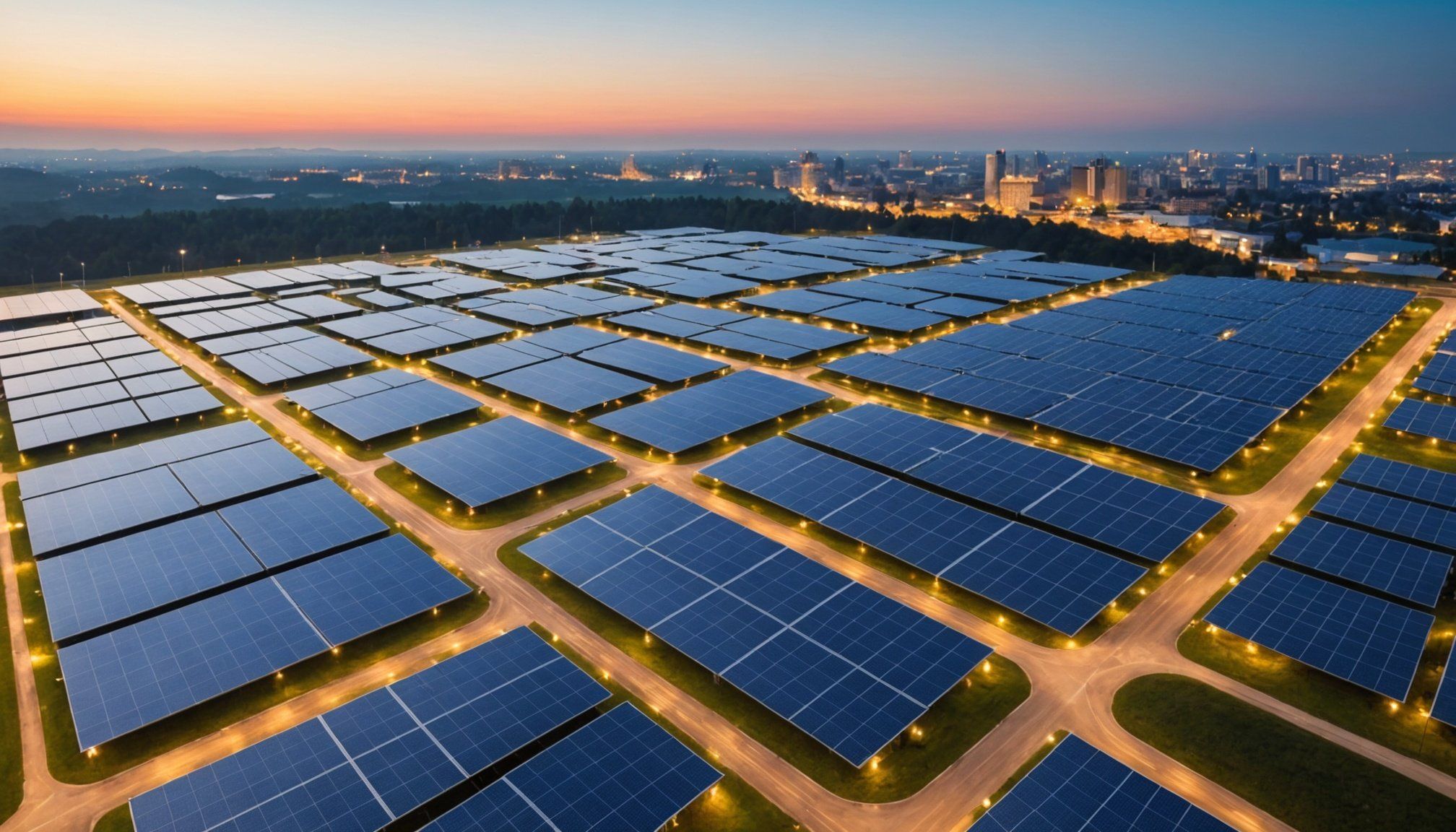Overview of AI in Energy Efficiency
In recent years, AI in energy efficiency has emerged as a pivotal force in modernizing and optimizing energy systems. By harnessing the power of artificial intelligence, we can revolutionize how energy is consumed, distributed, and conserved. AI in energy efficiency enhances system performance, predicts energy needs, and offers solutions for reducing consumption, ultimately leading to significant cost savings and reduced environmental impact.
At the heart of this transformation lies smart grid technology. This innovation facilitates real-time communication between energy providers and consumers, enabling more efficient energy distribution. Smart grids integrate AI to analyse consumption patterns, detect anomalies, and optimize energy flow, ensuring more reliable and efficient use of resources. This technology not only supports renewable energy integration but also aids in the seamless management of electricity demand and supply.
Additional reading : Developing a secure ai-driven identity verification system for safe remote access
The current landscape of AI applications in energy efficiency is vast and diverse. From automating building management systems to optimizing renewable energy outputs, AI is proving instrumental. In smart homes, AI can regulate heating and cooling systems based on predicted usage, while in industrial sectors, it enhances machinery efficiency. This dynamic interplay between AI and energy systems marks a promising step towards a sustainable future.
Advanced AI Techniques for Smart Grids
In the realm of smart grids, advanced AI techniques have revolutionized how energy systems operate, ensuring efficiency and reliability. At the forefront of these innovations are machine learning algorithms, which play a pivotal role in predictive maintenance. By analyzing patterns and historical data, these algorithms foresee potential equipment failures before they occur, minimizing downtime and maintenance costs.
Also read : Revolutionizing healthcare: an innovative ai platform for early disease detection
Neural networks are instrumental in optimizing load forecasting. They process vast amounts of data to predict future energy demands with remarkable precision. This enables energy providers to adjust supply, preventing wastage and ensuring consumers receive energy as needed. As these networks evolve, their predictions become ever more accurate.
Furthermore, predictive analytics bolster real-time energy consumption monitoring. By utilizing data analytics, the energy consumption patterns of consumers can be constantly evaluated. This ensures that energy distribution remains balanced across the grid, enhancing both performance and sustainability.
These techniques collectively transform preventive measures and operational strategies, ensuring that smart grids are not only responsive but also proactive in managing energy efficiently. The seamless integration of these advanced AI systems leads to smarter decisions, heightened reliability, and optimized grid operations, setting the foundation for a sustainable energy future.
Case Studies of AI Implementation
Smart grid solutions powered by AI implementation have revolutionized energy management. In exploring case studies, we’ll examine success stories demonstrating why AI-driven smart grid projects are thriving.
Take, for instance, the case of Pacific Gas and Electric. They have leveraged AI to enhance energy efficiency and predict outages. By implementing AI technologies, they reduced response times drastically, proving an impressive return on investment.
A common lesson from early adopters like Pacific Gas and Electric is the importance of data integration. An AI-enabled grid efficiently processes vast amounts of data, unlike traditional setups which often suffer from constraints. This translates into real-time insights, enabling quicker decision-making and enhanced grid reliability.
Furthermore, a comparative analysis reveals striking differences between traditional and AI-enhanced energy systems. The latter benefits from predictive maintenance. Predictive algorithms anticipate faults, leading to reduced maintenance costs and preventing prolonged downtimes.
The agility of AI implementation ensures adaptability to fluctuating demands and fosters resilience against unforeseen challenges. These case studies highlight the transformative potential of AI in modernizing energy systems, underscoring smart grid solutions as indispensable for future-ready utilities.
Benefits of AI in Smart Grid Optimization
Smart grids are evolving rapidly, and the integration of AI plays a crucial role in enhancing their operational efficiency. By predictive analytics, AI systems can anticipate equipment failures, leading to reduced downtime and ensuring seamless electricity flow. This ability to foresee and address potential issues before they occur optimizes the grid’s performance and reliability.
One of the standout advantages of incorporating AI is the potential for energy savings. AI algorithms assess patterns in energy consumption, enabling better resource allocation and reducing wastage. For instance, during peak demand hours, these intelligent systems can balance load distribution to prevent overuse of resources while maintaining consistent supply, thus contributing significantly to energy conservation.
Moreover, AI enhances demand response capabilities by predicting user needs and adapting resource allocation accordingly. This not only ensures that consumers receive an uninterrupted energy supply but also involves them more deeply in energy management. Enhanced consumer engagement is achieved through smarter applications and AI-driven insights that allow users to monitor and adjust their energy usage effectively.
In summary, the integration of AI into smart grids offers unprecedented benefits, streamlining operations, driving energy savings, and innovating how consumers interact with energy systems.
Challenges in Integrating AI into Energy Systems
Integrating AI into energy systems presents several challenges that stakeholders must consider to ensure effective implementation. One significant hurdle is the technical and infrastructural limitations inherent in current systems. Many energy infrastructures, particularly in older facilities, are not equipped to support the advanced capabilities required for AI integration. This mismatch can lead to significant obstacles, including the need for substantial updates or rebuilding of existing systems.
Another vital consideration is data privacy and security concerns. AI relies heavily on data to function effectively, but the sensitive nature of energy consumption data necessitates robust security measures. Without adequate safeguards, there is a risk of data breaches, which could have serious consequences for consumers and providers alike.
Additionally, balancing regulatory compliance with innovative AI applications is a crucial challenge. Regulatory bodies often have strict requirements and guidelines that energy providers must adhere to, sometimes restricting the deployment of cutting-edge AI technologies. Striking the optimal balance between maintaining regulatory compliance and embracing innovative solutions is essential yet complex.
Overall, addressing these smart grid hurdles requires multifaceted strategies that take into account the broad spectrum of AI integration challenges. By overcoming these obstacles, the potential benefits of AI in energy systems can be fully realized.
Future Trends in AI and Smart Grids
The growth and advancements in artificial intelligence (AI) related to energy management are set to transform traditional power systems. As the AI evolution progresses, we foresee significant changes. A focus lies on improving efficiency in smart grids through innovative energy storage solutions and predictive technologies.
Emerging trends in this sector include the integration of AI algorithms designed for optimal energy distribution. By analyzing vast datasets, AI can predict energy consumption patterns and adjust supply proactively, ensuring a balanced and efficient grid. Key technologies will focus on dynamic grid management, which allows real-time responsiveness to changing demand and supply conditions.
Policymakers are directing efforts toward fostering these advancements. Regulations and incentives are driving the adoption of renewable energy sources and their seamless integration into smart grids. This supports the development of eco-friendly and sustainable energy solutions, aligning with global environmental goals.
The impact of AI in smart grids extends beyond technical improvements. Envisioned AI applications are expected to reduce operational costs, enhance reliability, and contribute to a sustainable energy future. By leveraging AI-driven insights, stakeholders can make strides towards achieving energy efficiency, ensuring a resilient and adaptable power infrastructure.
Expert Opinions on AI’s Role in Energy Efficiency
In the rapidly evolving world of energy, expert opinions emphasise the transformative potential of AI. Leading researchers and industry stakeholders alike are investing heavily in this area, anticipating significant advancements. For instance, AI insights shed light on better optimising energy consumption, thus reducing waste and carbon footprints.
Insights from Leading Researchers in Energy and AI
Research conducted by renowned academics highlights AI’s capability to process vast datasets quickly and efficiently. These AI insights encourage more precise predictions and management of energy resources. By doing so, researchers assert that AI can play a pivotal role in achieving greater energy efficiency.
Perspectives from Industry Stakeholders on AI Adoption
Industry players express optimism regarding AI adoption. Their perspectives suggest that integrating AI into existing systems could streamline operations and enhance sustainability. Stakeholders note, however, that the transition requires strategic planning and investment in technology and workforce training.
Predictions on the Future of AI in Transforming Energy Systems
Looking ahead, predictions suggest that AI will become integral in revolutionising energy systems. Experts foresee AI not only optimising efficiency but also fostering innovative solutions for renewable energy integration. As the adoption of AI in energy sectors widens, these systems are expected to become smarter and more adaptable to changing needs.











